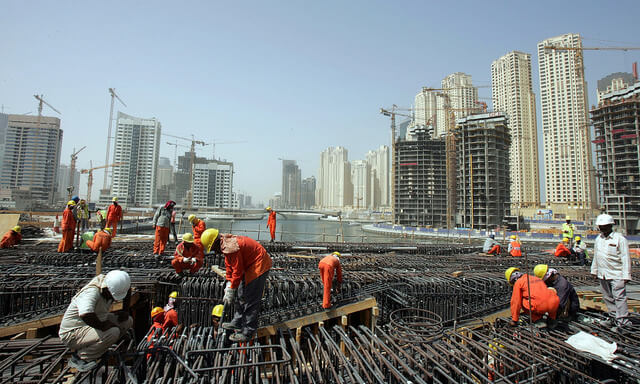The United Arab Emirates (UAE) has announced new visa rules and flexible labour laws aimed at improving the country’s economic competitiveness. The move is expected to greatly benefit migrant workers, including thousands of Indians.
On Tuesday, Dubai announced a five-year multiple entry visa to facilitate business trips for foreign employees of companies based in the emirate. The new visa scheme was formally launched by Dubai’s General Directorate of Residency and Foreigners Affairs (GDRFA) in coordination with the country’s Department of Economy and Tourism.
“The new five-year multi-entry visa is the latest in a series of initiatives launched by Dubai to create new opportunities for professionals and talented individuals across the world,” Dubai’s ruler Sheikh Mohammed bin Rashid Al Maktoum said. He noted that the new rules would be “productive” for both the work and lifestyle of foreign employees.
The GDRFA has already begun issuing new visas to employees of multinational companies, allowing them to visit and stay in the country for 90 days.
Also Read: The Middle East Is a Haven for Modern Day Slavery. And There Is No End in Sight.
The announcement follows the unveiling of new labour regulations in the private sector on Monday that will benefit foreign employees and migrant workers, including thousands of Indian labourers working in the Gulf country. The labour laws are intended to create an efficient labour market, attract talent, empower women, and increase the competitiveness of the UAE’s economy.
The laws have for the first time emphasised the protection of all employees in the workplace and has prohibited discrimination on the basis of race, colour, gender, religion, nationality, social origin, or disability. It also guarantees the protection of workers from harassment and unlawful seizure of documents. Furthermore, it protects workers from being forced to leave the country by employers.
Moreover, the new regulations have stipulated that the probation period of an employee must not exceed more than six months. It also exempts labour cases from judicial fees from all stages of litigation.
The legislation, issued by UAE President Sheikh Khalifa bin Zayed Al Nahyan, will cover all types of work categorisations, including full-time, part-time and temporary work. The laws are expected to go into effect by February 2022.
The UAE, along with many other Gulf countries, has been following the Kafala system for regulating and monitoring migrant workers, especially in the construction and domestic sectors. The system requires migrant workers to have a local sponsor, usually the employer, who is in charge of the workers’ visa and legal status.
Human rights organisations have criticised this practice and said that it facilitates the exploitation of poor migrant labourers. According to Human Rights Watch’s (HRW) “World Report 2020,” the Kafala system empowers employees to impose different types of punishment, including fines, prison and deportation, on workers who left their employers without permission.
HRW also states that the UAE’s labour laws excluded domestic and daily wage labourers from its purview, paving the way for “a range of abuses, including unpaid wages, house confinement, workdays up to 21 hours, and physical and sexual assault by employers.”
Against this backdrop, the new regulations will help migrant labourers in the UAE, including the thousands of Indian workers. In 2019 alone, the Indian Ministry of External Affairs received over 9,500 complaints of exploitation from migrant workers in the Gulf, a majority of whom work in the UAE.
The new laws signal a major shift in the UAE’s labour policy and are part of a slew of recent economic and social reforms, including tougher laws to protect women, and the decriminalisation of alcohol consumption, that are meant to benefit the country’s expatriate population. Experts have noted that the reforms are meant to project the UAE as a liberal country and attract more foreign labour and investment, especially as it seeks to diversify its economy from oil.

